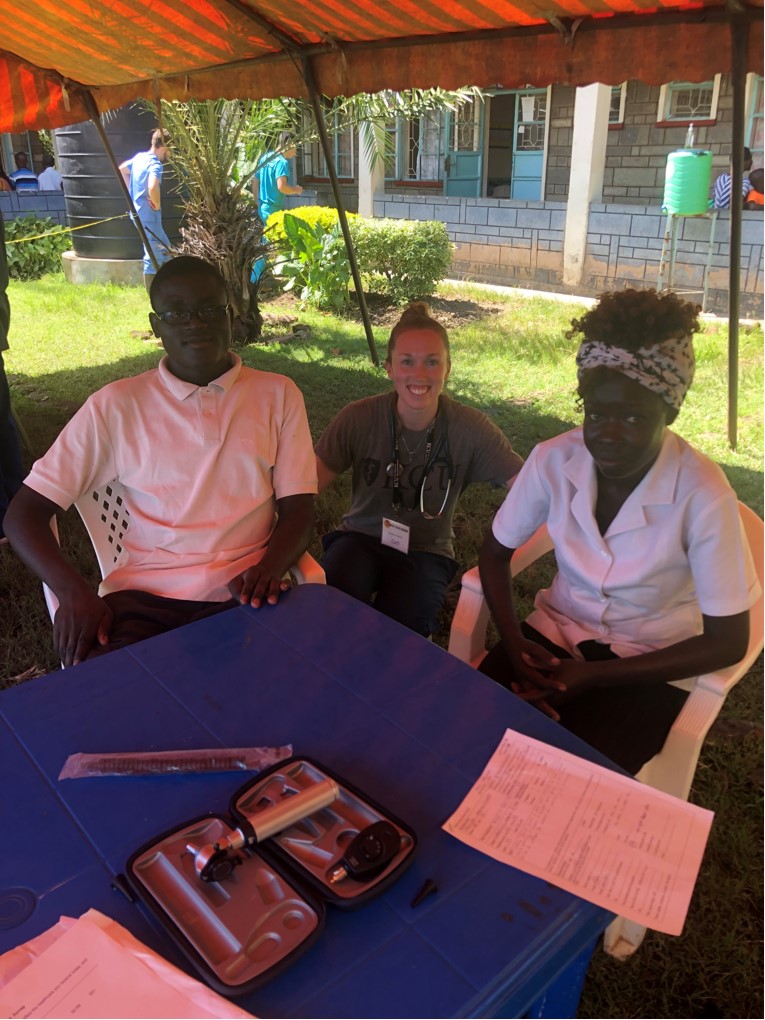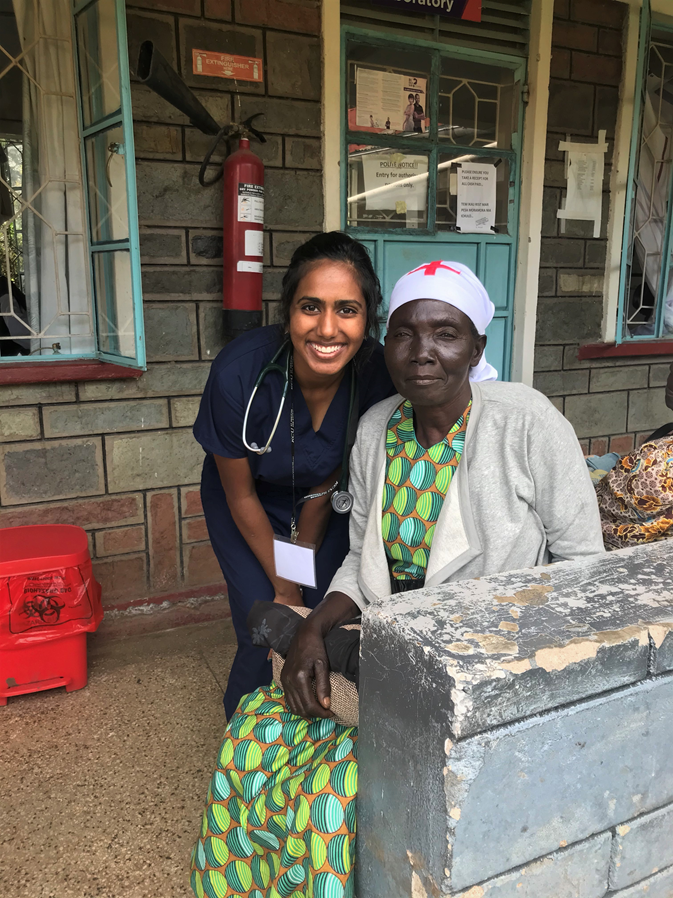KCU College of Osteopathic Medicine students with an interest in oncology and a heart for the underserved earned a 1st place award in the Bureau of International Osteopathic Medicine (BIOM) 2020 Research Competition: Research Abstract Category for their work with women, children, and healthcare providers in Kenya on the Human Papilloma Virus (HPV), a virus that causes cervical cancer. In addition, the students learned their research efforts are already having an effect.
 Fourth-year students Carli Edwards and Farzeen Syed collaborated with their faculty mentor, Gautam J. Desai, DO, FACOFP dist., director of KCU’s Honors Track in Global Health Medicine, to develop a research project examining attitudes and incorporating an educational component. Their study was implemented during KCU’s Global Health Outreach to Kenya, at the Mama Pilista Memorial Health Center, a nonprofit facility in the Wanjaya Village near Kisumu, Kenya. KCU’s medical students worked with male and female adolescents between 12-18 years old, female patients 18-65 and the health center staff as they studied HPV transmission, prevention, and the thoughts of the participants on HPV and the vaccine.
Fourth-year students Carli Edwards and Farzeen Syed collaborated with their faculty mentor, Gautam J. Desai, DO, FACOFP dist., director of KCU’s Honors Track in Global Health Medicine, to develop a research project examining attitudes and incorporating an educational component. Their study was implemented during KCU’s Global Health Outreach to Kenya, at the Mama Pilista Memorial Health Center, a nonprofit facility in the Wanjaya Village near Kisumu, Kenya. KCU’s medical students worked with male and female adolescents between 12-18 years old, female patients 18-65 and the health center staff as they studied HPV transmission, prevention, and the thoughts of the participants on HPV and the vaccine.
“It really struck me that cervical cancer, a cancer that we have controlled relatively well here in the United States due to pap smears and the HPV vaccine, is the leading cause of female cancer-related deaths in Kenya” said Syed. “I tried to research more about the topic, but there wasn’t much information out there especially regarding the region we were going to be in. I really wanted to take advantage of my time in Kenya by gathering data on the barriers for cervical cancer screening and prevention.”
The KCU students conducted surveys to learn about the screening histories of women in the village and to gauge their knowledge of HPV and the vaccine. Then they taught multiple seminars on sexually transmitted infections that included HPV. Edwards and Syed surveyed the groups a second time after the informational seminars and found the knowledge of both adolescents and patients improved as a result of their teaching.
“We wanted to learn what the major barriers were to accessing screening and vaccinations,” said Edwards. “What we found was just a lack of education. A lot of people didn’t know what cervical cancer is, and that that they should be getting screened for it. Those who knew about it did not know about the resources that were available.”
 The young women from KCU also learned to work as a team, with each other and the local health-care providers in Kenya. In addition, the experience of working in another country and speaking through translators offered unique and valuable insights on how to speak to patients about intimate health concerns.
The young women from KCU also learned to work as a team, with each other and the local health-care providers in Kenya. In addition, the experience of working in another country and speaking through translators offered unique and valuable insights on how to speak to patients about intimate health concerns.
“In clinical settings you have to learn to connect with patients,” said Desai, “Their work in Kenya was great experience for them to learn how to reach patients, especially young ones who might be bored or embarrassed, and make sure they have the health information that is necessary.”
Desai notes that research opportunities through KCU’s Global Track program enhances medical students’ opportunities for residency placement and hones skills in critical thinking. “As they take a research project from the initial stage to Institutional Review Board approval to the clinical setting, students learn about potential conflict of interest in studies and become familiar with ethical research,” Desai explained. “This gives them skills to look at literature and make appropriate decisions for their future patients, despite what may be discussed in the public or on the news.”
At the conclusion of the study, Syed and Edwards found that almost all participants were interested in receiving the HPV vaccine should it become available. As it turns out, the project was timely. A free HPV vaccination program arrived in the village just a month after the KCU mission. Another vaccination program is underway. Thanks to the education delivered by KCU’s medical students, women in the village had the knowledge they needed to seek out the vaccine. Syed and Edwards hope to continue working with Mama Pilista Health Center in the future.
“It’s just very exciting to be part of something that possibly could have the implications of helping people live healthier lives,” Edwards said.
As 1st place winners, Syed and Edwards were invited to present their project to 2020 OMED conference, held virtually due to the COVID-19 pandemic. They both say the entire experience was an important opportunity in the journey to become an osteopathic physician.
“Becoming a doctor is a long and arduous process, but experiences like being able to work in Kenya, even if it was for a few weeks, really helps remind me why I’m doing this,” Syed reflected. “I have more of an impact than I recognize, and it motivates me to keep moving forward for all my future patients.”


